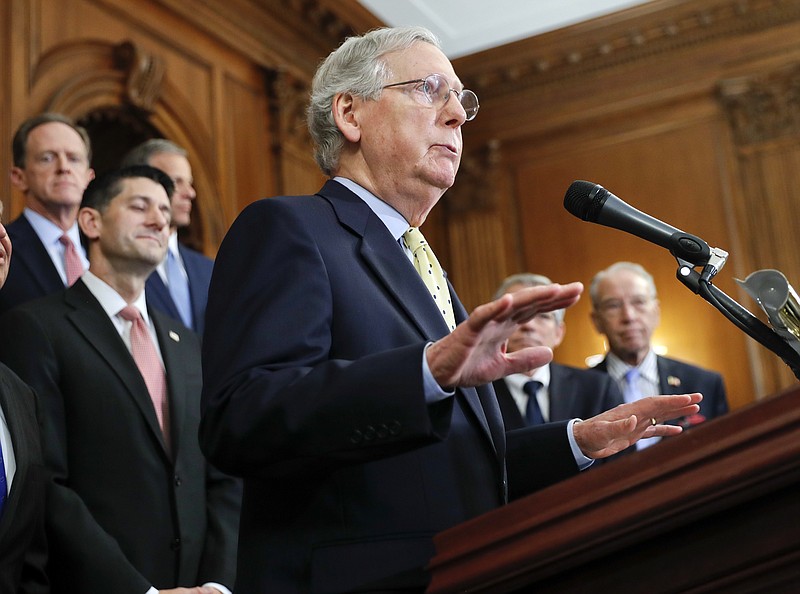Former Secretary of State Dean Acheson wrote a famous memoir, "Present at the Creation," about the birth of the post-World War II order - an order whose institutions produced six decades of security and growth for a lot of people. We're now at a similar moment of rapid change - abroad and at home. Many institutions have to be rethought. But any book about Washington today would have to be called "Absent at the Creation."
Surely one of the most cynical, reckless acts of governing in my lifetime has been President Donald Trump and the GOP's attempt to ram through a transformation of America's health care system - without holding hearings with experts, conducting an independent cost-benefit analysis or preparing the public - all to erase Barack Obama's legacy to satisfy a few billionaire ideologue donors and a "base" so drunk on Fox News that its members don't understand they'll be the ones most hurt by it all.
Democrats aren't exactly a fire hose of fresh ideas, but they do respect science and have a sense of responsibility to not play around with big systems without an ounce of study. Not so Trump. He scrapped the Paris climate treaty without consulting one climate scientist - and no GOP leader protested. Think about that.
That failure is particularly relevant because, as this column has been arguing, "climate change" is the right analytical framework for thinking about how we shape policy today. Why? Because we're going through three climate changes at once:
We're going through a change in the actual climate - disruptive, destructive weather events are steadily on the rise.
We're going through a change in the "climate" of globalization - going from an interconnected world to an interdependent one, from a world of walls where you build your wealth by hoarding the most resources to a world of webs where you build your wealth by having the most connections to the flow of ideas, networks, innovators and entrepreneurs. In this interdependent world, connectivity leads to prosperity and isolation leads to poverty. We got rich by being "America Connected" not "America First."
Finally, we're going through a change in the "climate" of technology and work. We're moving into a world where computers and algorithms can analyze (reveal previously hidden patterns); optimize (tell a plane which altitude to fly each mile to get the best fuel efficiency); prophesize (tell you when your elevator will break or what your customer is likely to buy); customize (tailor any product or service for you alone); and digitize and automatize more and more products and services. Any company that doesn't deploy all six elements will struggle, and this is changing every job and industry.
What do you need when the climate changes? Adaptation - so your citizens can get the most out of these climate changes and cushion the worst. Adaptation has to happen at the individual, community and national levels.
At the individual level, the single most important adaptation is to become a lifelong learner, so you can constantly add value beyond what machines and algorithms can do.
"When work was predictable and the change rate was relatively constant, preparation for work merely required the codification and transfer of existing knowledge and predetermined skills to create a stable and deployable workforce," explains education consultant Heather McGowan. "Now that the velocity of change has accelerated, due to a combination of exponential growth in technology and globalization, learning can no longer be a set dose of education consumed in the first third of one's life." In this age of accelerations, "the new killer skill set is an agile mindset that values learning over knowing."
At the community level, the U.S. communities that are thriving are the ones building what I call complex adaptive coalitions. These comprise local businesses that get deeply involved in shaping the skills being taught in the public schools and community colleges, buttressed by civic and philanthropic groups providing supplemental learning opportunities and internships. Then local government catalyzes these coalitions and hires recruiters to go into the world to find investors for their local communal assets.
These individual and communal adaptation strategies dictate the national programs you want: health care that is as portable as possible so people can easily move from job to job; as much free or tax-deductible education as possible, so people can afford to be lifelong learners; reducing taxes on corporations and labor to stimulate job creation and relying instead on a carbon tax that raises revenues and mitigates costly climate change; and immigration and trade policies that are as open as possible, because in an age of acceleration the most open country will get the change signals first and attract the most high-IQ risk takers who start new companies.
There was no good time for Trump to be president. But this is a uniquely bad time for us to have a race-baiting, science-denying divider in chief. He is impossible to ignore, and yet reacting to his daily antics only makes us stupid - only makes our society less focused on the huge adaptation challenges at hand.
The New York Times
